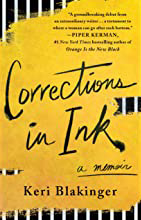 Keri Blakinger’s meticulous and thought-provoking memoir starts off with the story of an unexpected and sensational crime: An Ivy League student (also a heroin addict) is caught with $50k of heroin (oh – she’s also a drug dealer).
Keri Blakinger’s meticulous and thought-provoking memoir starts off with the story of an unexpected and sensational crime: An Ivy League student (also a heroin addict) is caught with $50k of heroin (oh – she’s also a drug dealer).
The Ivy institution is Cornell University and the student is Blakinger.
The first 250 pages of the book are, for the most part, a record of her incarceration: Jail, transfers to other jails closer to courthouses, and – finally – a series of prisons where she serves her time, No exhaustive examination of lawyers, judges, trials or the then-current outside world. Just prisons and prisoners.
There are some flashbacks – the figure skating is a surprise – and vague stabs at how she got to this point, but the first 250 pages really concentrate on her time in jail (before conviction) and then prison (post conviction – again, no mention of her lawyer, did she plea out?), a period of about three years. She illustrates in painful detail the prisons themselves and – especially – the prisoners she is locked up wth. How they are treated; how they are mistreated. How prisons do not promote personal betterment; it is just dehumanizing. And that’s the point.
We have a busted incarceration system.
The overwhelming minutiae, as well as the bleak day-to-day details (think One Day In the Life of Ivan Denisovich, but a longer time with shallower details), started to weigh down on me, and I put the book aside for a week or so.
But I left off just before the tone shifted.,The last fifty or so pages were lighter, covering the period just before her release up through the present day, a span of five or so years. For an overwhelmingly bleak book, it ends, overall, on mostly upbeat notes.
An English major (slash heroin addict) while she was in college, Blakinger relies on words to slowly get into journalism and ends up championing prisoners’ rights: She’s now with The Marshall Project (“Nonprofit journalism about criminal justice”), going into prisons as fellow felon to find out what can be done to make the time more bearable, She’s had some successes book drives, dentures, a rare success in a sexual assult case. The prisoners – current and former – talk to her because she’s one of them – always a powerful tool.
And – obviously – she’s published a book! Good for her.
I first read about this book by women writers on Twitter (it came out in June 2022), and after the first dozen or so references, I looked it up and bought it.
I was expecting something more along the lines of Susanna Kaysen’s memoir Girl, Interrupted (committed to an asylum at 18) or Sylvia Plath’s The Bell Jar, which is a novel but based on Plath’s very real life events. Both dark and filled with demons, but very wise and grounded.
Blakinger does talk about the stuff in her head – pre- and post-arrest. And it ain’t pretty, especially her experience with solitary confinement. But she’s more interested in the structure and execution of the criminal “justice” system than herself.
And she’s particularly interested in – and empathetic with – those who did time with her. I bet the pre-edit version of this memoir was 500+ pages, and most of the cuts were her stories about/discourses with her fellow inmates. I could be wrong, but I’m probably not far off.
Blakinger is white and her folks have money (she was at Cornell U.), but she never really addresses her privilege until the section after she was released, but she is relentless about herself on this. She realizes she got breaks – big and small – because of her station in the world. She mentions her car getting pulled over (while muling drugs) and got off with a warning – the cop saw a Cornell course guide in the car. What mischief could a white coed be up to?
And the privilege is just as important out of prison, especially when on parole. One tiny slip – maybe not your fault (a friend’s friend joins you for dinner. Your friend’s friend is, unknown to you, a felon) – and you could easily be back in prison. The dinner was at some nice French restaurant? Ah, how could you have known? Same situation but you’re black/brown and eating in a McDonald’s parking lot? You just violated your parole.
Finally, the title: Corrections in Ink. This phrase is used at least three times in the book, basically saying at the time she only has a pen so any corrections she makes to a journal, crossword puzzle or reporting notes are done “in ink.”
I think it has a deeper meaning: Blakinger is not going to memory-hole her crimes or her time. She’s going to own it: she’s a now-sober felon.
And her time served – her Corrections – is being put out there for all to see, printed – in Ink – in this book.
